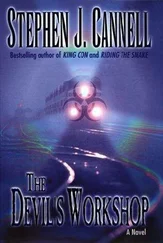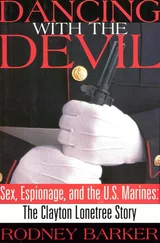Алан Джадд - The Devil's Own Work
Здесь есть возможность читать онлайн «Алан Джадд - The Devil's Own Work» весь текст электронной книги совершенно бесплатно (целиком полную версию без сокращений). В некоторых случаях можно слушать аудио, скачать через торрент в формате fb2 и присутствует краткое содержание. Жанр: sf_mystic, на английском языке. Описание произведения, (предисловие) а так же отзывы посетителей доступны на портале библиотеки ЛибКат.
- Название:The Devil's Own Work
- Автор:
- Жанр:
- Год:неизвестен
- ISBN:нет данных
- Рейтинг книги:3 / 5. Голосов: 1
-
Избранное:Добавить в избранное
- Отзывы:
-
Ваша оценка:
- 60
- 1
- 2
- 3
- 4
- 5
The Devil's Own Work: краткое содержание, описание и аннотация
Предлагаем к чтению аннотацию, описание, краткое содержание или предисловие (зависит от того, что написал сам автор книги «The Devil's Own Work»). Если вы не нашли необходимую информацию о книге — напишите в комментариях, мы постараемся отыскать её.
The Devil's Own Work — читать онлайн бесплатно полную книгу (весь текст) целиком
Ниже представлен текст книги, разбитый по страницам. Система сохранения места последней прочитанной страницы, позволяет с удобством читать онлайн бесплатно книгу «The Devil's Own Work», без необходимости каждый раз заново искать на чём Вы остановились. Поставьте закладку, и сможете в любой момент перейти на страницу, на которой закончили чтение.
Интервал:
Закладка:
'Have I seen Eudoxie before?' I asked. 'With Tyrrel?'
'Don't talk about that. She'd be very upset.'
It was hard to imagine Eudoxie upset but I didn't say anything. There were questions I wanted to ask — how had he come by her, where was she when Tyrrel died, where was she from, had she really embraced someone (Edward?) in that upstairs room — but I could see he didn't want to answer. Yet neither did he seem to want to part and we lingered a few more minutes. I think we talked about Lambeth Council.
The next year or so resembled its predecessor so closely that it is hard to distinguish them. Chantal and I lived as we had and Edward lived as he had, so far as I could tell. Eudoxie seemed to make no difference to the outward form of his life although I called less often. I felt inhibited by her presence, even in the background, as if were intruding, yet nothing in Edward's demeanour or hers suggested I was. We had them to dinner once, and they us. On neither occasion was anyone else present.
I heard the writing noise only once more during that period. At the time I wondered if I had imagined it but I now believe I did not. I was alone in Edward's room, waiting for him. The book he was writing was just a few sheets on his desk — that was during his first longhand period — and I had to force myself not to look at it. I was always intensely curious about how writers worked, how often they crossed out and so on. The manuscript that Tyrrel had passed on was also there but I saw it as simply a heap of bound papers in someone else's handwriting and took no notice. I sat in the usual chair and, in the usual silence, listened to see if! could hear the scratching again. After a while I thought I could, faintly at first but getting stronger. It was as before: regular, punctuated, rapid, the sound of a prolific and relentless pen. Edward startled me by opening the door and the noise went. I do not say it stopped because there was something about it that made me suspect it was always there, waiting to be heard. Edward glanced sharply at me but we began talking and the moment passed.
I know now that he often heard it. It did not begin with his possession of the manuscript although that was the essential preliminary. I learned all this when he gave me his third account of Tyrrel's death, near the end. In his first two accounts he did not mention Eudoxie but in fact she was there when Tyrrel died. During those moments while Tyrrel and Edward were facing each other beside the desk, each holding the manuscript, Eudoxie appeared at Edward's side. He felt her before he saw her. She stood just behind his left shoulder, very close, and she neither moved nor spoke. It was because of her, Edward thought, that he had had the impression that Tyrrel was looking at him but seeing something else; and it was because of her, he became convinced, that Tyrrel's eyes filled with horror.
He never was sure how much time passed between Tyrrel's backward fall and his own first movement. It may have been much longer than it felt. He came to himself as if from a trance and looked round for Eudoxie but she was not there. The only indication that she had been was that the door was left open. She must have come in for the death.
His immediate thought was that he could not now steal the manuscript and, in the way we all have, he convinced himself that he had never seriously intended to steal it anyway. But he did not let go of it and he looked at the first pages while standing by the body. Like me, he was unable at first to make any sense of it. The neat, spiky writing was legible so long as he focused on individual letters but when he tried to see a word, phrase or sentence whole it became gibberish. Nor was it a normal gibberish, as it were, but a sickening, dizzy-making miasma which at the same time seemed unaccountably and unpleasantly familiar, like a reminder during waking moments of a forgotten dream.
He left Tyrrel and went in search of Eudoxie, taking the manuscript. All the other ground-floor rooms were unlit and he began to wonder if he had imagined her presence. He didn't switch on any lights because the curtains were drawn back and the moonlight came in from the bay, so that the house was more in deep shadow than darkness. Eventually he called out. He had shaken hands with her on arrival but Tyrrel had not named her so he was reduced to calling out 'Hallo' and 'Excuse me' in English and French.
'Up here,' she called, in English.
It was the room in which I had seen her during the storm and in which I thought I saw her the night after. It was a bedroom. She was standing before the big window, facing the bay and the lights of Villefranche, her arms folded as when I watched her. Edward remembered that thin streaks of cloud were drifting across the moon. She did not turn when he entered.
'You have it with you?' she asked. He knew what she meant. 'Yes.'
'It is for you. He wanted you to have it.'
'Why? How do you know?'
'It was his wish.'
'But what is it? I can't make sense of it.'
'I will show you. You will have me too.'
'What do you mean?' It was surprise that made him ask. When she turned he could see by the whiteness of her teeth that she was smiling.
'I come with it.'
Edward spent the night there, and the next day and the next night, which was why he did not turn up at M. Englert's to meet us. He said later that Eudoxie might have stood in the window the night following with her arms folded, as I thought I saw from the garden, and that she might have turned to embrace him. There were many embraces. But there were other possible explanations.
'You don't always see what Eudoxie does at the time she does it,' he said. 'Put another way, you may see what but not always when. You saw her on the second night but she may have done it on the first. Perhaps she just wanted you to see her and so you did. Or perhaps she wanted to see you.
'Why should she?'
By the time we had this conversation Edward's blue eyes were as watery as old Tyrrel's. 'Because you were associated with me and she needed to make sure.'
'Of what?'
'That you weren't important.'
Edward and Eudoxie were alone in that house for some thirty-six hours. They were interrupted by the undertakers the next morning and by the need to make statements to the police. They pretended that Edward had neither spent the night there nor been present at the time of Tyrrel's death, matters which Eudoxie handled with her customary efficiency. Otherwise, the two nights and one afternoon passed as minutes, he told me. I believe the presence of Tyrrel's body made the first night particularly fervid. I am not sure that he and Eudoxie had a sexual relationship after that time. Perhaps they did — one can never know — but Edward spoke of it as a time of sexual obsession, if not slavery, and gave the impression that by so indulging they had got sex out of the way for good. Certainly, his later philandering was more in the nature of samplings than adventures, bites from apples not so much in hope of a new taste as to confirm the old. There were many apples but I suspect Eudoxie had inoculated him against any new taste.
The scratching, the writing sound, did not begin until he was back in London. At first he thought it was something to do with his room, expansion in the heating pipes or even mice in the ceiling, but then he noticed that it occurred only when he was writing or thinking about writing. Even then he still sought an everyday explanation but the rhythm and the sound of page after page being filled by an unfaltering pen ruled out everything normal. Whenever he sat down to write he would wait, pen in hand, for the sounds to start, and his own thoughts were strangled at birth. He tried writing with music playing, which he would have found difficult enough anyway, but the scratching made itself heard through, as he put it, his mind's ear. He tried working in the kitchen but it followed him. He was getting desperate by the time Eudoxie arrived.
Читать дальшеИнтервал:
Закладка:
Похожие книги на «The Devil's Own Work»
Представляем Вашему вниманию похожие книги на «The Devil's Own Work» списком для выбора. Мы отобрали схожую по названию и смыслу литературу в надежде предоставить читателям больше вариантов отыскать новые, интересные, ещё непрочитанные произведения.
Обсуждение, отзывы о книге «The Devil's Own Work» и просто собственные мнения читателей. Оставьте ваши комментарии, напишите, что Вы думаете о произведении, его смысле или главных героях. Укажите что конкретно понравилось, а что нет, и почему Вы так считаете.











